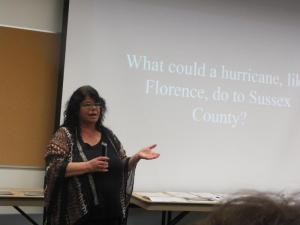Artesian, activists gear up for fight over spray fields

A fight over Artesian Water Company’s plan to take treated wastewater from Allen Harim’s Harbeson chicken processing plant and spray it on a 1,700-acre site off Route 16 in Milton is about to go to its next round.
The state Environmental Appeals Board will meet at 9 a.m., Tuesday, Oct. 9, in Dover, to decide on Artesian’s request to amend a construction permit to take wastewater from Allen Harim, which is currently discharging its wastewater into Beaverdam Creek. The permit has been appealed by the citizens group Keep Our Wells Clean, which has raised concerns about Allen Harim’s level of treatment of the wastewater, questioned how it will be ensured that the water sprayed on the fields is clean, and questioned the effect of the sprayed wastewater on the groundwater of neighboring communities. The Artesian spray fields border another spray field owned by Clean Delaware, which has had a history of contamination in the past.
Artesian and Delaware Department of Natural Resources and Environmental Control sought to dismiss the appeal in May, but the board decided to allow the case to move forward. The sides were not able to reach a settlement; a hearing will be held Oct. 9.
Artesian Chief Financial Officer and Treasurer David Spacht said the spray irrigation facility, newly named the Sussex Regional Recharge Facility, is close to completion. The 90 million-gallon lagoon, which will hold treated effluent from Allen Harim, is nearly completed and Artesian is working on the connections to the spray fields, Spacht said. Once construction is complete, he said Artesian will apply for operations permits from DNREC. Spacht said the permit applications should be submitted in the next two to three weeks. He said construction was delayed by frequent summer rain, but it was a good thing because Artesian was able to see how the fields absorbed water.
Once the facility is operational, Spacht said, Allen Harim is permitted to send a maximum of 10.5 million gallons of water per week. He said Allen Harim will be responsible for water treatment and testing.
Allen Harim is seeking a separate permit from DNREC to haul wastewater from its proposed deboning operation in Millsboro to the Harbeson plant for treatment. Spacht said water from Millsboro could be part of what Allen Harim sends Artesian for spray irrigation, as long as it fits under the permitted 10.5 million gallons a week.
“It’s treated on site just like the rest of their wastewater is. They have a minimum and maximum they can send to us. It has to maintain within those parameters, but if it does, sure, it will be the same quality of the other effluent coming to us,” Spacht said.
Spacht said Artesian has been meeting with surrounding communities and Milton Mayor Ted Kanakos to answer questions about the facility. Artesian CEO Dian Taylor said the company plans to hold workshops with citizens to discuss the science and operations of the facility.
Most of the questions remaining are related to operations, not construction, Spacht said, so the company was comfortable moving ahead with building the facility. He said Artesian anticipates the facility will be operational by the first quarter of 2019.
Citizens groups band together
Anthony Scarpa, co-founder of Keep Our Wells Clean, said Artesian and DNREC tried to get them to drop their appeal because the group’s concerns were about the operation of the facility, not the construction. But Scarpa said on advice from counsel Kenneth Kristl, they have chosen to appeal the construction because it will be much easier and less costly for Artesian to fix problems before the facility is operational.
“We just felt very strongly that their studies are flawed. They really didn’t do the kind of in-depth environmental studies they should have done. The big thing they didn’t do is they never took the Clean Delaware site into consideration when they approved the spray fields,” Scarpa said.
He said DNREC has been incompetent in its handling of the case, going out of its way to protect corporate interests over the public.
Scarpa and fellow Keep Our Wells Clean co-founder Andrea Green, along with environmental activist Maria Payan, have formed an umbrella organization called Sussex Health and Environmental Network, intended to bring citizens groups from all over Sussex County together to work on water and environmental issues.
The group held its first meeting at Milton library Oct. 1, where Scarpa and Green discussed the upcoming Artesian appeal.
The project dates back to a development called Elizabethtown, which did not proceed after the 2008 collapse of the real estate market. Artesian purchased the site in 2013 with the intention of building a facility then called the Northern Sussex Regional Water Recharge Facility. Green said Artesian approached the town of Georgetown and the city of Rehoboth Beach about handling their treated wastewater; in late 2017, Artesian and Allen Harim teamed up to build 8 miles of pipeline to carry treated wastewater from Allen Harim’s Harbeson plant to the Milton spray fields.
Scarpa, for his part, is skeptical of Allen Harim’s testing of the water. He said Allen Harim has a history of environmental violations related to wastewater and that the plan itself is flawed.
Payan said, “The people see the magnitude of these problems. You can’t just keep adding to it. Until we sit down and talk about it, nothing is going to get fixed.”























































